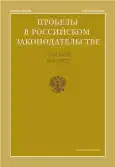Export control of the Russian Federation and changes in its legal regulation in the period 2014–2024 years
- Авторлар: Agapov A.Y.1, Khalipov S.V.1
-
Мекемелер:
- Russian Foreign Trade Academy (RFTA) of the Ministry of Economic Development of the Russian Federation
- Шығарылым: Том 18, № 4 (2025)
- Беттер: 150-161
- Бөлім: International Legal Sciences
- URL: https://journal-vniispk.ru/2072-3164/article/view/313165
- DOI: https://doi.org/10.33693/2072-3164-2025-18-4-150-161
- EDN: https://elibrary.ru/JORDBU
- ID: 313165
Дәйексөз келтіру
Аннотация
The article is devoted to the analysis of the export control system in the Russian Federation, its role in ensuring national security and protecting the interests of the state in conditions of active foreign economic activity. The author emphasizes the importance of export control as a mechanism to prevent the export of goods and technologies that may threaten Russia's security or violate international obligations. The text focuses on issues related to both international and national export controls on weapons of mass destruction (WMD) and other dangerous goods. The changes in this area of regulation that have occurred against the background of a Special military operation and pressure from Western countries are being discussed. It examines how the Russian Federation interacts with international export control regimes, including organizations such as the Nuclear Suppliers Group, the Zangger Committee, the Wassenaar Arrangement, and the Australia Group. These interactions are aimed at improving the effectiveness of combating the spread of sensitive technologies. Regulatory legal acts, the structure of the Russian export control system, as well as the role of government agencies in its regulation are analyzed. Special attention is paid to the problem of the lack of a common legal framework in the Eurasian Economic Union (EAEU) for Russian exporters. Key aspects are highlighted, such as the need to obtain special export permits, monitoring the fulfillment of export license conditions, and liability for violations. The author identifies a number of problems faced by participants in foreign economic activity. These include excessive bureaucracy, lack of information, and excessive oversight by government agencies. In conclusion, the importance of reforming the export control system is emphasized in order to make it more effective and reduce administrative barriers. This, in turn, will create more favorable conditions for domestic suppliers and help ensure national security in modern economic realities.
Толық мәтін
##article.viewOnOriginalSite##Авторлар туралы
Artem Agapov
Russian Foreign Trade Academy (RFTA) of the Ministry of Economic Development of the Russian Federation
Хат алмасуға жауапты Автор.
Email: agapov.000@inbox.ru
SPIN-код: 5297-6340
postgraduate student
Ресей, MoscowSergey Khalipov
Russian Foreign Trade Academy (RFTA) of the Ministry of Economic Development of the Russian Federation
Email: shalipov@vavt.ru
SPIN-код: 6247-0387
Cand. Sci. (Law), Assoc. Prof., Head of the Public Law Department
Ресей, MoscowӘдебиет тізімі
- Abazova E.H. Prohibition of import and export of certain types of goods as a measure of influence (counteraction) applied to ensure security in the Russian Federation . Gaps in Russian legislation. 2022. No. 4. Pp. 246–250. (in Rus.).
- Bataev V.V., Kachalin V.P., Pleshivtseva Y.E., Tkachev V.K., Trubitsyn K.V. The export control role in the customs policy of the Russian Federation. Investment and Innovation Management. 2016. No. 2. Pp. 16–25. (in Rus.).
- Borisova E.M., Mikhailova I.L. Current problems and directions of export control development in Russia. BIT. 2021. No. 2 (18). Pp. 58–63. (in Rus.).
- Bragina E.A. Formation of the regulatory and legal framework of the national system over nuclear export control in the USSR as a necessary condition for ensuring nuclear security. Global Nuclear Security. 2018. No. 4 (29). Pp. 87–96. (in Rus.).
- Vityuk V.V., Fedorenko K.P. Export control in the Russian Federation. Russian Foreign Economic Bulletin. 2014. No. 7. Pp. 63–88. (in Rus.).
- Dzirun I.A., Ismailov S.T., Petrushina O.M. Assessment of the export control indicators dynamics in the Russian Federation. Economy and Business: theory and practice. 2025. No. 4 (122). Pp. 116–120. (in Rus.).
- Ivanov A.A., Filonov A.D., Glazkov M.A. Export control in the Russian Federation at the present stage: features and new challenges. Economy and Business: theory and practice. 2022. No. 11–1. Pp. 155–158. (in Rus.).
- Kozlova A.S., Shafieva A.R. The problem of implementing export control in the Russian Federation. Economy and Business: theory and practice. 2020. No. 11–2. Pp. 44–46. (in Rus.).
- Kortunov P. The non-proliferation regime in the 21st Century: new challenges and threats. Russian International Affairs Council. 26.06.2020. URL: https:.russiancouncil.ru/analytics-and-comments/columns/military-and-security/rezhim-nerasprostraneniya-v-xxi-veke-novye-vyzovy-i-ugrozy/ (accessed: 01.07.2023). (in Rus.).
- Levkin V.A. Problems of export control in the Russian Federation. Electronic scientific journal "Science Diary". 2023. No. 11. (in Rus.).
- Mozzhegorova O.A., Pyshkin Y.V. Features of export control implementation under Eurasian Economic Union operation. Bulletin of the Russian Customs Academy. 2017. No. 4. Pp. 100–107. (in Rus.).
- Features of dual-use products export control of: potential barriers for exporters and ways to overcome it. JSC "Russian Export Center", ANO "Analytical Center under the Government of the Russian Federation", 2017. 33 p.
- Revenko L.S., Revenko N.S. Russia’s participation in multilateral export control regimes as an instrument for protecting interests of russian exporters. Russian Foreign Economic Bulletin. 2014. No. 7. Pp. 49–61. (in Rus.).
- Revenko N.S. Export control of Russia in the missle area. Economy and Management. 2016. No. 2. Pp. 112–117. (in Rus.).
- Roskoshnaia M.S. Identification of current threats to the export control system: international and russian experience . Proceedings of Saratov University. New Series. Series: Economics. Management. Law. 2016. No. 3. Pp. 320–325.
- Savenok A.V., Filippova E.O. Export control in the Russian Federation. Scientific-Methodological Electronic Journal "Concept". 2017. Vol. 39. Pp. 2896–2900. (in Rus.).
- Shereshov A.V., Fedotova A.Y. Trends in export control in the Russian Federation. International Journal of Humanities and Natural Sciences. 2021. No. 5–2. Pp. 307–310. (in Rus.).
Қосымша файлдар








